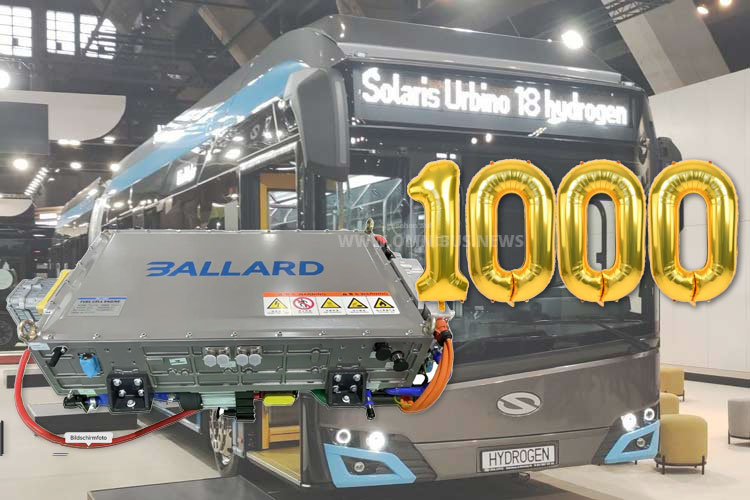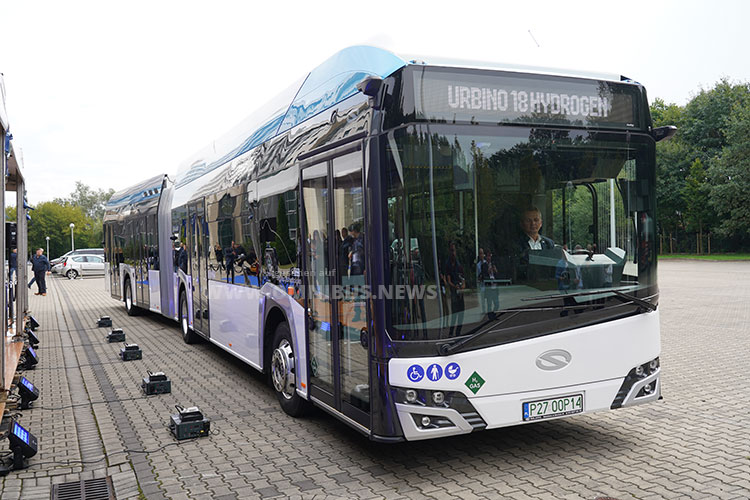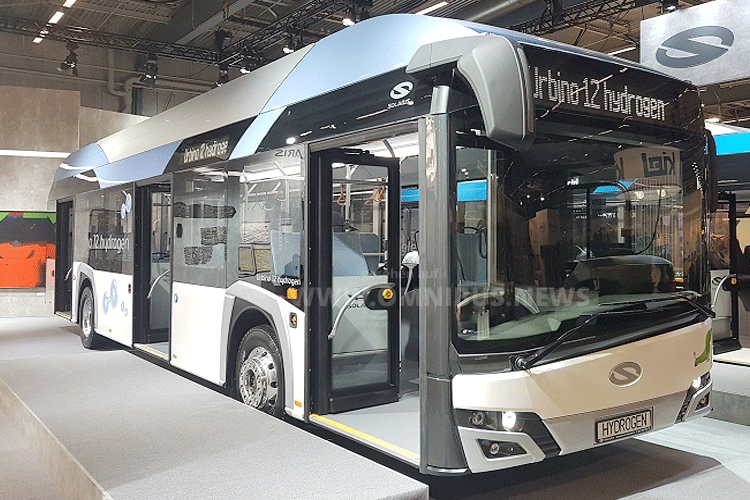
Solaris has ordered 1,000 FC modules from Ballard Power Systems for the FCEV models in the Urbino series. Photo: Ballard/Schreiber/Solaris; Assembly: omnibus.news

Solaris offers the Urbino 18 as a hydrogen version. Photo: Schreiber

Solaris presented the Urbino 12 hydrogen at the UITP Summit in Stockholm. Photo: Schreiber
Anyone involved with FCEV buses cannot ignore Ballard Power Systems. The Canadian company, which specialises in the production and sale of fuel cells and FC modules, has been active on the market since 1979. The largest shareholder of the listed company is the Chinese company Weichai Power.
In 2018, the Canadians and Chinese agreed on a strategic partnership to jointly manufacture fuel cell-based drives for commercial vehicles. Weichai Power is a supplier to the automotive industry and is active in engine construction.
The co-operation with Weichai ensures that more than half of the turnover is generated in China. However, the market in Europe is not uninteresting either, as the latest major order shows: Ballard Power Systems has announced the largest order in the company’s history to date.
The Polish bus manufacturer Solaris, now part of the Spanish CAF Group, has ordered a total of 1,000 fuel cell modules. These are to be delivered by the end of 2027 for installation in buses from the Urbino hydrogen series.
The major order is an extension of the contract and includes previous orders (300 FC modules) and around 700 newly ordered FC modules. According to Ballard Power Systems, aftermarket services and guarantees are now also part of the contract.
Javier Iriarte, CEO of Solaris, made it clear at the annual results press conference that fuel cell buses would make up an increasingly large proportion of the portfolio. „Solaris is a leader in the use of hydrogen technology in public transport. To date, we have handed over almost 200 hydrogen-powered Urbino buses to customers. The order books are full, with orders for more than 500 Urbino hydrogens over the next two years.“
Commenting on the Solaris order, Ballard Power Systems CEO Randy MacEwen said: „We are on the path to widespread deployment of fuel cell buses, which is a key lever to enable economies of scale and cost reduction initiatives to improve economics and emissions reduction for fleet operators.“
Solaris currently offers the Urbino 12 hydrogen and Urbino 18 hydrogen. The 12-metre bus has been available with an FCEV drive since 2019, with the 18-metre articulated bus following in 2022. Depending on the size of the vehicle, corresponding FC modules are used: the FCmove-HD module with 70 kW is installed in the Urbino 12 hydrogen and the FCmove-HD+ module with 100 kW in the 18-metre articulated bus. (BallardPowerSystems/Solaris/omnibus.news/PM/Sr)
Found an error in the article? Report it now!

Solaris hat 1.000 BZ-Module bei Ballard Power Systems für die FCEV-Modelle der Urbino-Baureihe bestellt. Foto: Ballard/Schreiber/Solaris; Montage: omnibus.news

Solaris stellte den Urbino 18 im September 2022 auch mit Hydrogen-Antrieb vor. Foto: Schreiber

Auf dem UITP Summit in Stockholm zeigte Solaris den Urbino 12 hydrogen. Foto: Schreiber
Wer sich mit FCEV-Bussen beschäftigt, der kommt an Ballard Power Systems nicht vorbei. Das kanadische Unternehmen, das sich auf die Produktion und den Vertrieb von Brennstoffzellen bzw. BZ-Module spezialisiert hat, ist seit 1979 am Markt aktiv. Größter Anteilseigner des börsennotierten Unternehmens ist das chinesische Unternehmen Weichai Power.
Im Jahr 2018 haben sich die Kanadier und Chinesen auf eine strategische Partnerschaft geeinigt, um gemeinsam Antriebe auf Basis von Brennstoffzellen für Nutzfahrzeuge zu fertigen. Weichai Power ist Zulieferer für die Automobilindustrie und im Motorenbau tätig.
Die Kooperation mit Weichai sorgt dafür, dass mehr als die Hälfte des Umsatzes in China erzielt wird. Aber auch der Markt in Europa ist nicht uninteressant, wie der jüngste Großauftrag zeigt: Ballard Power Systems meldet den bisher größten Auftrag in der Firmengeschichte.
Der polnischen Bushersteller Solaris, heute Teil der spanischen CAF-Gruppe, hat insgesamt 1.000 Brennstoffzellen-Module bestellt. Diese sollen bis Ende 2027 für den Einbau in Omnibusse der Urbino hydrogen-Baureihe geliefert werden sollen.
Der Großauftrag ist eine Vertragserweiterung und schließt frühere Bestellungen (300 BZ-Module) und rund 700 neu bestellte BZ-Module mit ein. Außerdem seien nun nach Angaben von Ballard Power Systems vertraglich Aftermarkt-Dienstleistungen sowie Garantien ein Teil des Vertrages.
Javier Iriarte, CEO von Solaris, hatte im Rahmen der Jahresbilanzpressekonferenz deutlich gemacht, dass Brennstoffzellen-Omnibusse am Portfolio einen immer größeren Anteil ausmachen würden. „Solaris ist führend beim Einsatz der Wasserstofftechnologie im öffentlichen Nahverkehr. Bis heute haben wir fast 200 wasserstoffbetriebene Urbino an Kunden übergeben. Die Auftragsbücher sind voll, für die nächsten zwei Jahre liegen Bestellungen für mehr als 500 Urbino hydrogen vor.“
Der CEO von Ballard Power Systems, Randy MacEwen, sagte anlässlich des Auftrages von Solaris an: „Wir befinden uns auf dem Weg zu einem breiten Einsatz von Brennstoffzellenbussen, der ein entscheidender Hebel ist, um Skaleneffekte und Kostensenkungsinitiativen zu ermöglichen und damit die Wirtschaftlichkeit und die Emissionsreduzierung für Flottenbetreiber zu verbessern.“
Solaris hat aktuell den Urbino 12 hydrogen und Urbino 18 hydrogen im Angabot. Seit 2019 ist der 12m Linienbus mit FCEV-Antireb erhältlich, der 18m lange Gelenkbus folgte 2022. Je nach Gefäßgröße kommen entsprechende BZ-Module zum Einsatz: Im Urbino 12 hydrogen wird das FCmove-HD-Modul mit 70 kW, im 18m langen Gelenkbus das FCmove-HD+-Modul mit 100 kW verbaut. (BallardPowerSystems/Solaris/omnibus.news/PM/Sr)
Fehler im Beitrag gefunden? Jetzt melden!
